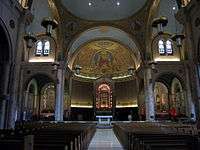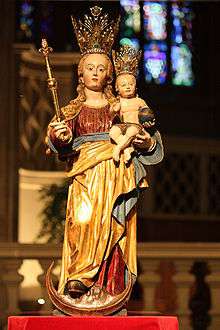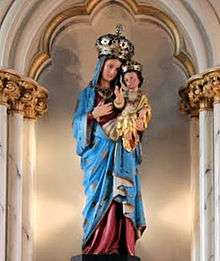Basilica and National Shrine of Our Lady of Consolation

The Basilica and National Shrine of Our Lady of Consolation is a minor basilica of the Roman Catholic Church and a shrine to the Virgin Mary, operated by the Conventual Franciscan Friars. It is located in Carey, a village in Northwest Ohio. It was made a national shrine by the U.S. Conference of Catholic Bishops.
Significance

One of the two Roman Catholic basilicas in Ohio, it is one of some 60 basilicas in the United States. It is the site of an annual pilgrimage of Roman Catholics (primarily from the Middle East) to mark the Feast of the Assumption of Mary, celebrated 15 August of every year. The basilica is designated as a shrine to Our Lady of Consolation, Mary, Consoler of the Afflicted.
History
Devotion to Our Lady of Consolation spread to the United States, where the first shrine was built in Carey, Ohio. A replica statue was commissioned and arrived from Luxembourg in 1875. Cures and healings reportedly continue to take place at the shrine to the present day.
Bishop Joseph Schrembs, first bishop of the Diocese of Toledo, invited the Conventual Franciscans of the Immaculate Conception Province in Syracuse, New York to take charge of the shrine. In 1919, the railroads began offering reduced rates to Carey in summer during pilgrimage season.[1]
In the summer of 1923 a contingent of Ku Klux Klan members arrived intent on holding a counter demonstration to the annual procession of the eve of the Feast of the Assumption, but ended holding a gathering on the outskirts of town.[1]
Basilica and shrine complex
The shrine complex includes the basilica, the original 1875 wooden parish church, the parish school, a rectory housing the pastor and other Franciscan priests, a provincial house which houses Franciscan friars, a convent for resident and itinerant nuns, a retreat center providing lodgings for lay and religious pilgrims, a gift shop, and a cafeteria.
Original church
_-_St._Edward_Church%2C_exterior.jpg)
The original parish church, the first church in Carey, began construction in 1868, under the direction of Father Edward Vatmann, pastor of St. Michael’s in Findlay, Ohio. At its dedication, it was given the name of St. Edward. In 1873 Father Joseph Peter Gloden, pastor of the church of St. Nicholas, Frenchtown, came to serve the parish.[2] The faithful in Carey worked to support the church's construction and prayed to Mary under the title of Our Lady of Consolation. The congregation renamed the church in her honor upon its completion.
Father Gloden, a native of Luxembourg, obtained a replica of the statue of Our Lady of Consolation venerated in the Cathedral of Luxembourg. The wooden statue, thirty-six inches high, depicted Mary holding the infant Christ with mother and child dressed in ornate garments. On May 24, 1875, the statue of Our Lady of Consolation was carried in procession to the church, from the church of St. Nicholas, in Frenchtown, some seven miles away.[2] It is claimed that the first miraculous event occurred during this procession. As the procession marched, a severe storm raged in the entire area. Throughout the seven-mile walk, not a drop of rain touched the statue nor anyone in the procession.
The original parish church remains today and still sees daily use for early morning Mass, as well as for special programs and devotions.
Basilica

The increasing number of pilgrims necessitated a bigger church. In 1924 construction of the red-brick Romanesque church was finished.[1] The present Byzantine-style basilica is located at the corner of Clay & West streets. The main floor contains the narthex, the sanctuary, and the altar which maintains its pre-Vatican II configuration, separating the celebrant from the congregation by an altar rail and providing religious statuary and votive candles in alcoves along both sides of the sanctuary. A choir loft containing the basilica's pipe organ is located above the narthex overlooking the sanctuary. A second sanctuary is located in the basement, along with confessionals for the sacrament of reconciliation. Along the sides of the basement sanctuary, display cases show the various items cast off by those reportedly healed, including artificial limbs, canes, crutches, and even litters.

Shrine Park
The nearby Shrine Park is the site of a set of Stations of the Cross that stretches nearly a mile along the park's winding perimeter road, encircling an outdoor altar situated under a large dome supported by four marble columns. The dome is finished in gold and supports a statue at its apex of the Blessed Virgin Mary which can be seen from miles away. Shrine Park serves as the destination for the religious procession from the basilica on the Feast of the Assumption
Our Lady of Consolation
Starting in the 2nd century, Catholics venerated Mary as Our Lady of Consolation, one of her earliest titles of honor. The title of Our Lady of Consolation, or Mary, Consoler of the Afflicted, comes from the Latin Consolatrix Afflictorum.[3] It is found in the Litany of Loreto.
Augustinians
The origin of this invocation is derived from the Augustinian monks who propagated this particular devotion. In 1436 the Confraternity of the Holy Cincture of Our Lady of Consolation was founded in Bologna, Italy. It was based on an Augustinian tradition which hold that Saint Monica in the fourth century, was distraught with anxiety for her wayward son, Augustine, and that Mary gave her a sash which the Virgin wore, with the assurance that whoever wore this belt would receive her special consolation and protection.[4] Along with Augustine, and Monica, Our Lady of Consolation is one of the three patrons of the Augustinians. The "Augustinian Rosary" is sometimes called the "Corona (or Crown) of Our Mother of Consolation".
In the 1700s members of the Augustinian Order introduced devotion to Our Lady of Consolation to the island of Malta. On the 1st December 1722 the Prior General of the Augustinian Order Fr Thomas Cervioni issued the Decree for the erection of the Confraternity of Our Lady of Consolation in the church of St Mark, run by the Augustinians at Rabat, although the devotion had been practiced for some time before. By this time the custom of asking for the final blessing before death in the name of Our Lady of Consolation was very popular, and the monks were given a dispensation to leave the monastery at any time to confer it. Processions in Our Lady's honor were suspended during the French occupation of 1798 to discourage the gathering of crowds.[5] The feast day is celebrated on the last Sunday of October with pyrotechnic displays by Our Lady of Consolation Fireworks Factory.[6]
Turin
A ancient story relates St Eusebius of Vercelli brought back an icon of Our Lady of Consolation when he was returning from exile in Egypt in 363. This icon was presented to the city of Turin. Later St Maximus, Bishop of Turin, established a small shrine to house the icon in a church dedicated to St Andrew. The icon became the object of great veneration, and the church became the Santuario della Consolata. Giuseppe Allamano, rector of the Santuario della Consolata founded the Consolata Missionaries in 1902; they brought to devotion to Africa. At the age of nineteen Joseph Marello of Turin contracted typhus. He attributed his recovery to Our Lady of Consolation and went on to found the Oblates of St. Joseph.[7]
There are several versions of the image of Our Lady of Consolation. The original one is in Turin at the Santuario della Consolata. A star on her shoulder is characteristic of almost all the images. The traditional depiction of Our Mother of Consolation in Augustinian houses shows Mary holding the child Jesus on her lap. Jesus and Mary both hold the Augustinian cincture in their hands.[8]
In France the dioceses of Vannes, Valence, Montpelier, Laval, Nantes, Périgueux, Tours and many others, possessed churches or chapels dedicated to Mary under this title.[9] In 1652, Pope Innocent X encouraged devotion to Our Lady of Consolation by establishing a confraternity.

Luxembourg
The cult of Our Lady of Luxembourg, Comforter of the Afflicted, was initiated by the Jesuits in 1624 and led to the election of Our Lady as the protectress of the City in 1666 and of the Duchy in 1678. After the destruction of the old pilgrimage chapel at the time of the French Revolution, the statue of Our Lady of Luxembourg was moved to St. Peter church, today's Cathedral in Luxembourg City.[10] Statues depicting her can be found in niches in buildings throughout the city of Luxembourg.[11] From there the devotion was adopted by the English Benedictine nuns of Cambrai.
United States
Immigrants from Luxembourg transposed the cult of Our Lady of Consolation to the United States.
- In 1848, Luxembourg immigrants began to settle in the area around Dacada, Wisconsin. The oldest statue of Our Lady of Luxembourg found in the United States, was brought to Dacada by a Luxembourg immigrant, Anna Margaret Deppiesse, in 1849. Mrs. Deppiesse donated it to St. Nicholas Church, where it can be found in an alcove shrine below the choir loft. When the church was remodeled in 1941, a mural depicting Our Lady of Luxembourg (Mary, Consoler of the Afflicted) was added to the apse in the sanctuary. The mural, which honors the parish’s Luxembourgian roots, was painted by liturgical artist, Bernard Grenkhe, using the “al secho” method (i.e., painting on wet plaster so as to make the image permanent.[12]
- During the Civil War, three parishioners of St. Augustine's Parish in Leopold, Indiana fought for the North and were imprisoned at the notorious Andersonville Prison. Henry Devillez, Isidore Naviaux and Lambert Rogier, formerly of Belgium, vowed that if they survived, one of them would make a pilgrimage to Luxembourg and obtain a copy of the statue of Our Lady of Consolation that stood in their ancestral church. Rogier went to Luxembourg in 1867 and upon his return enshrined it in St. Augustine's, where it now stands to the left of the main altar. In September 2013, Archbishop Joseph W. Tobin of Indianapolis dedicated a larger outdoor garden shrine.[13]
- One of the two main celebrations held each year in the Tacony section of Philadelphia were Our Lady of Consolation’s Feast Day Parade. (The other was Memorial Day.) Each July statues of the saints were paraded through the streets of the neighborhood.[14]
Germany
Another center of veneration and pilgrimage, which also adopted Our Lady, Comforter of the Afflicted is Kevaeler in Germany, not far from the Dutch border. In 1642 a copperplate engraving, representing Our Lady of Luxembourg, was installed in a sanctuary erected the same year. It is one of the best visited Catholic pilgrimage locations in north-western Europe. Pope John Paul II visited in 1987.[15]
England

There is a shrine of Our Lady of Consolation in West Grinstead, in the Diocese of Arundel and Brighton in England. The Shrine Church dates from 1876 and is the first Shrine in honour of Mary to be established in England since before the Reformation. There was in the Church of St. John the Baptist at Perth, an altar inscribed to "St. Mary of Consolation".[9]
With the approval of the Archbishop of Turin in northern Italy, the new church was affiliated to the original sanctuary of Our Lady of Consolation, and a painting, closely resembling the miraculous Shrine Painting in the Santuario della Consolata of Turin, enriched with similar indulgences and privileges, was brought to West Grinstead. The Shrine Statue was canonically crowned by the Papal Delegate, Bishop Butt, on behalf of Pope Leo XIII, in July 1893.[9]
The Basílica de Nuestra Señora de la Consolación is located in Táriba, Venezuela. The Augustinian church of Our Mother of Consolation in the Shiroyama district of Nagasaki is also named in her honor.[16]
Feast day
The feast of Our Lady of Consolation is one of the solemnities not inscribed in the General Roman Calendar, but which are observed in particular places, regions, churches or religious institutes. Augustinians observe September 4;[17] the Benedictines July 5.
The popular girls name "Consuela" is derived from this title.[18]
References
- 1 2 3 Endres, David J., "The Making of an American Catholic Devotion: The Shrine of Our Lady of Consolation in Carey, Ohio, 1873-1929", paper presented to the American Catholic Historical Association Mid-year Meeting held at Xavier University, Cincinnati, Ohio, March 28, 2014
- 1 2 "Original Shrine", Basilica and National Shrine of Our Lady of Consolation
- ↑ Conventual Franciscans, Our Lady of Consolation Province
- ↑ Phipps, Patty. "the origin or history of "Our Lady of Consolation", Marian Library, University of Dayton
- ↑ Schembri, Henry. The Augustinian Friars and Devotion to Our Lady in the Maltese Islands, p. 313, Malta Historical Society
- ↑ "Feast of Our Lady of Consolation", Malta Tourism Authority
- ↑ "Saint Joseph Marello" Long Island Catholic, May 16, 2012
- ↑ "Our Mother of Consolation", Midwest Augustinians
- 1 2 3 The shrine of Our Lady of Consolation of West Grinstead
- ↑ Weyrich, Jean. "The origin of the cult in Luxembourg", Institut Grand Ducal, Luxembourg
- ↑ Bunkers, Suzanne. "Images of Our Lady of Consolation", 1998
- ↑ St. Nicholas Church, Dacada, Wisconsin
- ↑ Cornwell, Patricia Happel. "Archbishop rededicates Marian shrine at St. Augustine Parish in Leopold", The Criterion, September 20, 2013
- ↑ Downing, Jeanne. "Tacony", Center for Northeast Philadelphia History
- ↑ "The Pilgrimage -Site of Kevelaer", city of Kevelaer
- ↑ Our Mother of Consolation, Nagasaki
- ↑ "Mary - Mother of Consolation", Augustinians
- ↑ Nevins, Albert J., and Ball, Ann. A Saint for Your Name: Saints for Girls, Our Sunday Visitor Publishing, 1999 ISBN 9780879736002
External links
| Wikimedia Commons has media related to Basilica and National Shrine of Our Lady of Consolation (Carey, Ohio). |
- Basilica and National Shrine of Our Lady of Consolation official website
- "The Story of the Miracle of Noreto and the Intercession of Our Lady of Consolation", St. Anthony Festival
40°57′03″N 83°23′14″W / 40.95085510°N 83.38712391°WCoordinates: 40°57′03″N 83°23′14″W / 40.95085510°N 83.38712391°W
